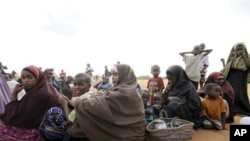Minorities in conflict-ridden Somalia are suffering rape, summary executions and other human rights violations, a report by Minority Rights Group International (MRG) said Wednesday.
Over the past twenty years, near-constant violence from civil war and recent Islamist insurgencies has forced hundreds of thousands of Somalis to flee their homes. Crossing the border to neighboring Kenya or the autonomous regions in the north, many refugees seeking reprieve are often met by corrupt police, inadequate shelter and miserable conditions in the camps they hope to call home.
But according to a report by United Kingdom-based Minority Rights Group, Somalia's minority communities are met with even more desperate circumstances.
The report, entitled No Redress: Somalia's Forgotten Minorities, found that members of Somali's minority clans face neglect and further marginalization upon arrival to supposedly safer areas. Report Author Martin Hill told VOA that many also face physical violence.
"In Puntland the main problem is in the displaced camps which are very large and containing quite a high percentage of minorities," he said. "There it is a situation of gender based violence against women and girls by majority men from Puntland clans and security forces."
Social, economic and political life in Somalia is dominated by the country's major ethnic groups, the Darod, Dir, Rahanweyn and Hawiye clans. While minority groups make up - by some estimates - as much as one third of the country's population, MRG says they have been largely excluded from mainstream life.
This system of exclusion has been further entrenched by the "4.5 system" which guides the make-up of the Somali government. The system was introduced to ensure that power was shared among the four major clans, with consideration given to the so-called "fifth clan" of minorities, but in practice government positions have been dominated by politicians from the major groups.
Hill explained that many of Somalia's minority groups, such as the Bantu, Benadiri and Gaboye are descendants of indigenous farmers taken over by invading pastoralists or slaves brought in from east and southern Africa. Therefore many of these groups have traditionally been viewed as lesser members of Somalia.
The report also found that these minorities, as well as small numbers of Christians in the region, have been targeted by al Qaida-linked insurgent group al Shabab. According to the report, Shabab has carried out executions by shooting and beheading and imposed severe restrictions on religious freedom.
Evidence of minority repression among Somali refugees has been briefly documented by groups such as Human Rights Watch and Amnesty International. In an earlier report, Human Rights Watch found that minority grievances were being suppressed by majority clans communicating to officials in the Dadaab refugee camps of Northeastern Kenya.
But Martin Hill says such observations lack sufficient focus on minority rights. The author called on human rights groups as well as the United Nations to develop serious plans to prevent minority repression both in Somalia and among refugee populations worldwide.
Report Finds Widespread Abuse of Minorities in Somalia




